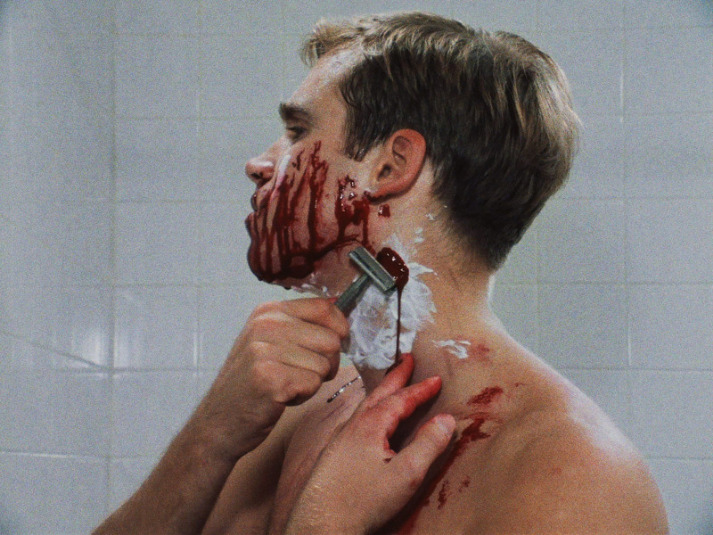RELATED ARTICLE
Walking with Scorsese
By Bilge Ebiri
The Criterion Collection

“A filmmaker shows what his career will be in his first 150 feet of film,” François Truffaut once wrote. He was talking about Jean Vigo at the time, but he might as well have been talking about Martin Scorsese, whose early short films—from the narrative works of his student years at New York University and immediately afterward to the midlength documentaries he made as his feature-filmmaking career was getting underway—reveal the energy, eclecticism, and invention that would make him one of the most exciting American directors of the seventies and, eventually, one of the great artists of our time.
Scorsese’s preternatural command of the medium—including his ability, from the beginning, to make heavily referential work that nonetheless steers clear of seeming derivative—is nowhere better demonstrated than in 1967’s five-minute The Big Shave, not his first film (and so technically outside the limits set by Truffaut) but one he made soon after finishing at NYU. The luminous static shots of a bare bathroom that kick off the movie—gleaming chrome faucets, a porcelain sink so spotless it’d be a sin to touch it—recall the fetishized images of engines, gears, bolts, and steel surfaces that open Scorpio Rising (1963) and Kustom Kar Kommandos (1965), both by avant-garde legend Kenneth Anger, whose influence Scorsese has often cited. The surreal, increasingly chaotic action that follows also harks back to Anger’s work—particularly Scorpio Rising, which starts in solemn reverie before accelerating into rapid-fire mayhem—and certainly owes a debt to Luis Buñuel, that high priest of international cinematic surrealism, who had entered a late-career resurgence in the sixties. But it’s also pure Scorsese, in the nonchalance with which a young man (Peter Bernuth) enters the bathroom, rubs on some shaving cream, and calmly cuts his face to ribbons. What we first think may be mishaps—an errant slice below the ear here, an upper-lip gash there—are soon revealed to be . . . well, something else, as the man carries on shaving and cutting himself, the blood streaming from his face, filling the once-immaculate white sink, and dribbling onto the clean tile floor.

Scorsese intended for The Big Shave to be a comment on U.S. involvement in Vietnam—the film ends with the gnomic credit “Viet ’67”—the war being very much on every young person’s mind at the time (the director’s heroes in the French New Wave had also begun tackling the issue). And certainly, we can sense in this portrait of a man blankly inflicting violence on himself a metaphoric anger at a nation engaged in slaughter and tearing itself apart while its ostensible leaders proceeded as if everything were normal. But there’s also more to The Big Shave than that. The twenty-four-year-old Scorsese, full of ambition, had been struggling to finish and find a distributor for his debut feature, eventually called Who’s That Knocking at My Door (1967). A promised internship with Paramount—his prize for winning the Screen Producers Guild award for best student film of 1964, for his junior-year project It’s Not Just You, Murray!—had been scuttled after the studio changed leadership. “Consciously, [The Big Shave] was an angry outcry against the war,” Scorsese reflected years later. “But in reality, something else was going on inside of me, I think, which really had nothing to do with the war. It was just a very bad period, a very bad period.” The music that plays over the film, Bunny Berigan’s classic 1937 recording of “I Can’t Get Started,” may have been a popular love song, but it also speaks to emotional paralysis, an inability to move forward.
Did audiences take the film as an expression of rage or simply as a cosmic, surreal joke? The film had been made for and financed by an avant-garde film festival in Knokke-le-Zoute, Belgium. Scorsese wasn’t present at the premiere there but later recalled the journalist and programmer Amos Vogel telling him that, as Scorsese put it, “the reaction was amazing. People were angry. People were laughing, and I think laughing out of the horror of it, maybe.” But according to the director, when The Big Shave screened alongside Jean-Luc Godard’s Weekend at the New York Film Festival in 1968, “the reaction was hilarity. And I said, Hmm, I guess it’s funny.”
“Scoresese’s fascination with slaughter has always been that of an anthropologist—he is calm in its face but cannot turn away.”
“When we hear Scorsese’s parents, we realize that the now-iconic cadences of Scorsese’s characters are not fanciful movieland creations but reflections of a real American subculture.”